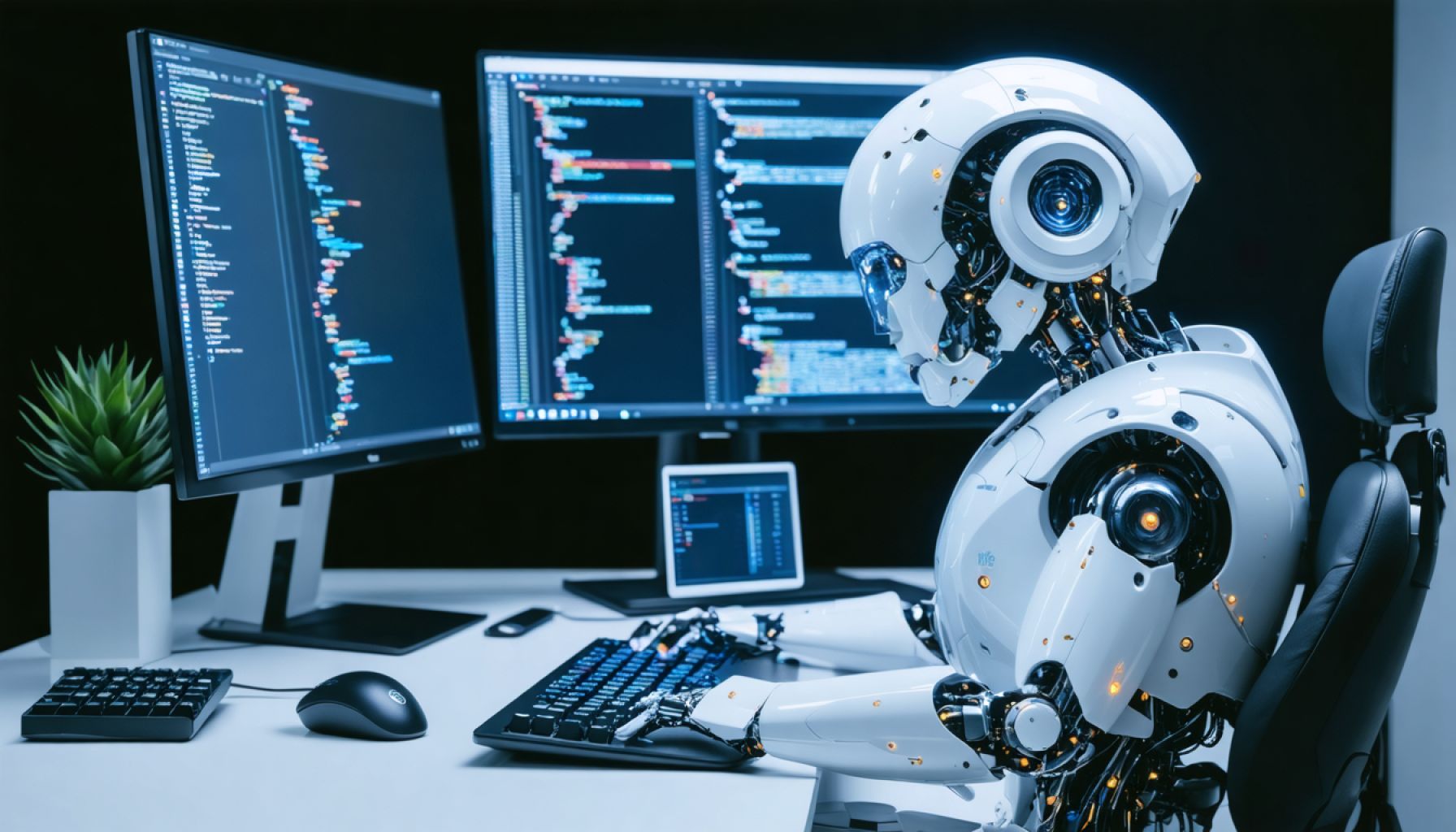- AI is significantly transforming the role of programmers, enabling a new era of digital innovation.
- Programming tasks benefit from AI’s capabilities, such as anticipating errors, enhancing security, and optimizing performance.
- AI tools allow programmers to shift focus from mundane tasks to strategic development and creative innovation.
- The evolution of code through AI empowers programmers to become visionary engineers rather than just code architects.
- The collaboration between AI and human creativity is essential for unlocking future technological potential.
- The ongoing transformation emphasizes a symbiotic relationship between intelligent machines and human ingenuity.
In the bustling world of technology, a silent yet powerful force reshapes the landscape — artificial intelligence. As AI grows in sophistication, the role of programmers transforms, paving the way for a new era of digital innovation. Once painstakingly written line by line, code now benefits from AI’s ability to anticipate, suggest, and even autonomously create.
Imagine a seasoned musician witnessing a virtuoso perform on an instrument that adapts in real time. Similarly, programmers today watch AI tools streamline complex tasks — predict errors, enhance security, and optimize performance records. Traditional barriers crumble as teams harness AI capabilities, allowing them to focus on strategic development rather than mundane debugging.
Visualize code evolution: Algorithms that once crawled over silicon highways now compete in interpretative dance, improvising and iterating faster than ever before. The sheer speed and agility AI brings can feel like handing over the controls to a primal force, one that empowers and challenges human creators in equal measure.
Yet, amid AI’s promise lies a deeper narrative of partnership. Programmers do not become obsolete; they shift roles, evolving from mere code architects to visionary engineers. Creativity ignites as AI handles mundane tasks, granting humans greater freedom to innovate and evolve software solutions that were once only speculative fiction.
This unfolding tale of transformation offers an intriguing takeaway: As AI continues to evolve, the human touch remains indispensable. Unleashing the full potential of tomorrow depends on harmonizing intelligent machines and human creativity, marking the dawn of a symbiotic relationship poised to redefine the digital frontier.
The Secret World of AI-Powered Programming: What You Need to Know
How AI is Transforming Programming and Development
Artificial Intelligence (AI) is radically transforming the landscape of programming and development. AI tools now assist in writing code, predicting errors, and optimizing performance, shifting the role of programmers from manual coders to visionaries who can leverage AI for innovation.
How-To Steps & Life Hacks for Using AI in Programming
1. Integrate AI Tools: Use AI-driven tools like GitHub Copilot or Tabnine, which offer intelligent coding suggestions and automate repetitive tasks.
2. Code Error Prediction: Implement AI systems that predict and highlight potential errors before the code runs, saving you debugging time.
3. Performance Optimization: Leverage AI algorithms to analyze and streamline your code’s performance automatically.
4. Continuous Learning: Regularly update your skills to understand and work efficiently with AI technologies, ensuring that you remain relevant in a rapidly changing field.
Real-World Use Cases
– Autocomplete Functionality: Advanced IDEs equipped with AI provide autocompletion far beyond simple syntax, understanding the context of code.
– Smart Debugging: AI can suggest fixes for bugs and identify root causes during the development phase, as seen in companies utilizing tools like DeepCode or Snyk.
– Project Management & Scheduling: AI algorithms can predict project completion timelines and manage resources more effectively.
Market Forecasts & Industry Trends
The global AI in Software Development market is expected to grow exponentially, with a projected CAGR of over 45% from 2022 to 2030 (Source: Market Research Future).
Reviews & Comparisons
– GitHub Copilot vs. Tabnine: GitHub Copilot offers a robust AI tool backed by Microsoft’s Azure, better suited for full projects, while Tabnine provides quick, context-aware code completion.
– Pros and Cons:
– GitHub Copilot: Seamless integration with Visual Studio Code, but privacy concerns over code data.
– Tabnine: Excellent for multilingual support but lacks some of the deeper integrations of Copilot.
Controversies & Limitations
– Ethical Concerns: The use of AI in programming raises questions regarding code ownership and potential biases in AI-trained models.
– Skill Loss: There is a risk that programmers might become over-reliant on AI tools, potentially losing fundamental coding skills over time.
Security & Sustainability
AI tools in coding can improve security by identifying vulnerabilities. Tools like CodeQL, used by many developers, offer automated detection of security risks.
Insights & Predictions
As AI continues its march forward, it’s predicted that roles such as ‘AI Integration Specialist’ will emerge, combining traditional software engineering skills with AI-specific expertise.
Tutorials & Compatibility
Most modern IDEs (such as Visual Studio Code and JetBrains IntelliJ IDEA) now support plugins or integrations with AI coding assistants, making compatibility straightforward for most development environments.
Pros & Cons Overview
– Pros: Increases efficiency, reduces repetitive tasks, enhances creativity.
– Cons: Potential loss of core skills, privacy issues, and ethical dilemmas.
Actionable Recommendations
– Start by adopting a basic AI-powered coding tool and experiment with it during your development process.
– Engage with communities and forums dedicated to AI in programming to exchange knowledge and tips.
– Regularly assess and update your AI tools to keep pace with technological advancements.
For more about AI-driven software tools, visit GitHub or JetBrains.
